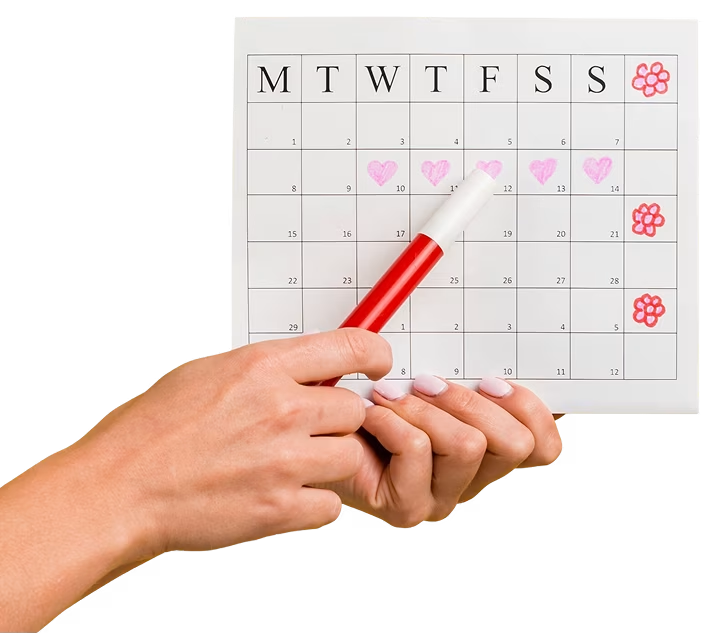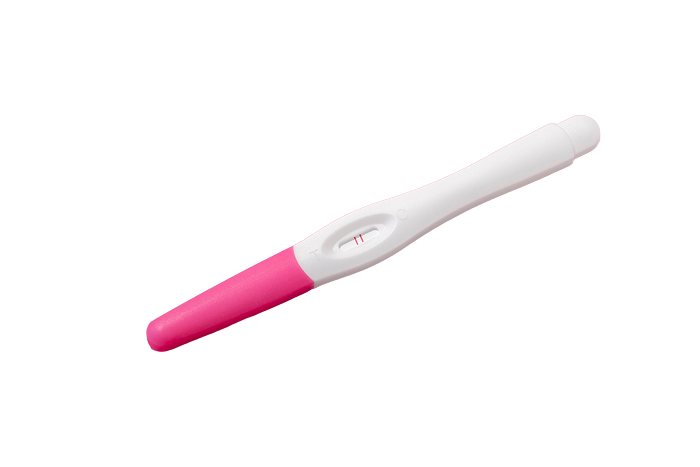1 to 2 Weeks Pregnant

When you're 1 or 2 weeks pregnant, it might come as a surprise to learn that you're not actually pregnant yet. These early weeks are counted from the first day of your last menstrual period (LMP), which is used to estimate your due date. During this time, your body is preparing for ovulation and potential conception. Understanding what happens during weeks 1 and 2 can help you optimize your chances of getting pregnant and support a healthy start.
Here’s what to expect at 1 to 2 weeks pregnant:
Although there’s no baby yet, these weeks are crucial for laying the groundwork. Next, we’ll explore what happens during ovulation and how to recognize early pregnancy signs in the coming weeks.
How Is Pregnancy Calculated?
Here’s the thing: Because of the way pregnancy is usually measured, you’re not actually pregnant during the first two weeks or so of your pregnancy. Healthcare providers calculate the length of an average pregnancy as 280 days, which is 40 weeks, starting from the first day of your last menstrual period—this is known as the LMP dating method.
So, when you’re 1 week pregnant, you’re having your period. At 2 weeks pregnant, you’re probably ovulating. And since ovulation happens about 14 days after the start of your period (assuming you have a 28-day cycle), with fertilization and conception following, you can’t really become pregnant until around week 3 at the earliest.
But although at 1 and 2 weeks pregnant you may not notice any of those very early signs of pregnancy, there’s still a lot happening on the inside.
Highlights at 1 to 2 Weeks Pregnant
Before we get into all the details, here are a few highlights to look forward to during the first two weeks of pregnancy:
How to Calculate Due Date?
It's natural to wonder about your due date right away when you find out you’re pregnant, as you’re likely looking forward to meeting your new baby! So, how can you calculate your due date?
For an estimate, try our Due Date Calculator, where you can simply enter the first day of your last menstrual period (LMP) or the date of conception.
Again, healthcare providers use the LMP method to determine your estimated due date. So once you start to notice those early pregnancy signs or have the feeling that you might be pregnant, take a pregnancy test at home or confirm your pregnancy with your healthcare provider so you can calculate your due date!
Body Changes at 1 and 2 Weeks Pregnant
Your journey through pregnancy has officially begun, but as mentioned above, you’re not actually pregnant yet. This is a difficult concept to grasp at first, and many people wonder what happens in the first week of pregnancy, or what it feels like to be 2 weeks pregnant. Again, because of the way pregnancy is calculated, you won’t feel any symptoms of being pregnant during those first days—or possibly first weeks. But after two weeks, an exciting series of events starts to take place inside your body:
What this all boils down to is that you won’t feel any of those very early signs of pregnancy in weeks 1 or 2. If you have yet to conceive, then it makes sense that you wouldn’t notice anything! Therefore, things like morning sickness can’t start at 1 week pregnant, and you won’t feel symptoms like pregnancy-related belly pain or discharge at 1 or 2 weeks pregnant.
Your Belly at 1 and 2 Weeks Pregnant
Wondering about your belly size at 1 week or how your tummy feels at 2 weeks pregnant?
Every person and every pregnancy is different, but it’s safe to say that you won’t see any difference in your pregnant belly’s size at 1 or 2 weeks. Remember that you’re not actually pregnant during those first two weeks.
Here’s an idea of how your belly may progress throughout your pregnancy, and for more information, you can read our week-by-week baby bump guide. Remember, every bump is unique!
Your Baby at 1 to 2 Weeks Pregnant
Wondering “What does the baby look like at 2 weeks?” If you're 1 or 2 weeks pregnant according to your due date calculation, there's actually no baby at 2 weeks in the womb just yet. That might sound confusing, but as we mentioned earlier, providers start counting pregnancy from the first day of your last menstrual period (LMP), not from the date of conception. This means that at 1 and 2 weeks pregnant, ovulation and fertilization have not occurred yet. Conception typically takes place around week 3 of your pregnancy.
At this early stage, your body is preparing for ovulation. Hormones are working behind the scenes to mature a follicle in your ovary, ready to release an egg. So while it's exciting to imagine a 1 or 2-week embryo, these terms aren’t medically accurate yet, because fertilization hasn’t happened.
But rest assured, your body is getting ready for the big moment. For a clear explanation of this timeline, check out our guide to fetal development week by week, and see how the embryo will begin to develop in the coming weeks.
How Do You Track Ovulation?
If you’re trying to get pregnant or just want to understand your body better, knowing the best way to track ovulation can really help. Ovulation is when your ovary releases an egg, usually about 2 weeks before your next period. This is the time when you're most likely to conceive.
Here are some simple and trusted ways to track ovulation:
Many people find that combining a few of these is the best way to track ovulation accurately. It can take a little practice, but it’s worth it if you’re trying to conceive.
Ovulation Symptoms
Being able to recognize ovulation symptoms can also help pinpoint your fertile window. The most common symptoms of ovulation include:
These ovulating symptoms vary from person to person, and some may not notice them at all. If you're wondering what ovulation signs and symptoms are, the combination of mucus changes and LH surge detection tends to be the most reliable.
When Do Pregnancy Symptoms Start?
During weeks 1 and 2, you may not realize you’re pregnant, and you probably won’t experience any pregnancy symptoms yet, as it is still very early. In fact, you might not have even conceived until you are about 3 weeks pregnant. So, how early do pregnancy symptoms start? There are several signs of pregnancy that you could experience in the following weeks:
Now that you know these early signs, take our Early Signs of Pregnancy Quiz to test your knowledge!
When to Take a Pregnancy Test?
When should you take a pregnancy test? The short answer: after your missed period. While it can be tempting to test early, the best time to take a pregnancy test is usually after your period is due. This gives your body enough time to produce detectable levels of the pregnancy hormone hCG (human chorionic gonadotropin) in your urine.
When is the earliest you can take a pregnancy test? Some highly sensitive home tests claim to detect hCG as early as 8–10 days after ovulation, around week 3 of your pregnancy. So yes, you can get a positive pregnancy test at 3 weeks, but the results are more reliable if you wait a few more days. Testing too early may lead to a false negative.
If you're wondering about a 1–2 week pregnant test, it’s important to remember that at this point, you’re not technically pregnant yet. You’ll likely need to wait until week 4 or later for a positive test result.
To understand more about how pregnancy tests work, check out our dedicated guide.
Think you might be pregnant? Take our Am I Pregnant quiz. It won’t tell you for sure, but it’s all good fun!
1 to 2 Weeks Pregnant: Things to Consider
Even though you probably haven’t experienced any signs of pregnancy very early on in weeks 1 to 2, it’s best to do everything you can to stay healthy and safe. In fact, it’s always wise to take some precautions as soon as you start trying to conceive or learn that you’re pregnant.
Lifestyle Adjustments
Even simple adjustments can help support you as you start your pregnancy! Though you’ll want to consult your healthcare provider to determine what’s best for you, some worthwhile lifestyle changes and precautions include
Folic Acid
When you start trying for a baby or learn that you’re pregnant, folic acid is essential, as it’s a B vitamin that helps reduce the risk of certain birth defects that affect the baby’s brain and spine. Your healthcare provider can recommend a prenatal vitamin that contains at least 400 micrograms of folic acid.
Eliminating Bad Habits
Pregnancy is also a great time to eliminate some less healthy habits, too, including
In addition, your provider may recommend limiting your daily consumption of caffeine. Consult your healthcare provider to learn the best ways to stay healthy and safe when you’re pregnant.
For more general advice, download our Go-To Pregnancy Guide!
1 to 2 Weeks Pregnant: Your Checklist
Yes, it’s early, but it’s also an exciting time! As you anticipate your new pregnancy, consider the following to-dos:
FAQS AT A GLANCE
Not usually. Most healthcare providers date pregnancy from the first day of your last menstrual period (LMP), not the actual day of conception. Since ovulation and fertilization typically happen about 2 weeks after your LMP, it’s hard to know the exact date you became pregnant without fertility tracking or assisted reproductive technology (like IVF).
How We Wrote This Article The information in this article is based on the expert advice found in trusted medical and government sources, such as the American Academy of Pediatrics and the American College of Obstetricians and Gynecologists. The content on this page should not replace professional medical advice. Always consult medical professionals for full diagnosis and treatment.
- Cleveland Clinic. “Fetal Development.”
- Cleveland Clinic. “Ovulation.”
- Kids Health. “Week 1.”
- Mayo Clinic. “Fetal Development: The First Trimester.”
- Mayo Clinic. “Pregnancy Week by Week.”
- Mayo Clinic. “Symptoms of Pregnancy: What Happens First.”
- Mayo Clinic. “What ovulation signs can I watch for if I want to get pregnant?”
- National Library of Medicine. “Length of Human Pregnancy and Contributors to its Natural Variation.”









